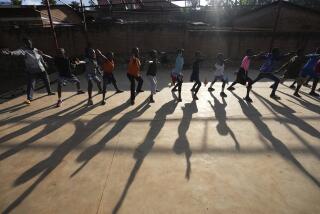End of the Line for Lies
- Share via
South Africa has many martyrs but none more important than Steven Biko, the charismatic student leader who paid with his life 20 years ago when he and his Black Consciousness Movement encouraged young blacks to stand up against white oppression. Now, in the light of the new democracy, Biko’s killers are expected to come forward seeking amnesty. Whether they are pardoned or punished may point the way the nation will follow in its efforts to close its wounds and get past the evil suffered under apartheid.
The five former police officers are expected to take their case to the South African Truth and Reconciliation Commission, which is headed by Desmond Tutu, the retired Anglican archbishop and Nobel Peace Prize winner. Government officials say the men will outline their roles in the 1977 beating of Biko, who died of head injuries in police custody, and forever put an end to lies of the apartheid regime that he died after a hunger strike or after going berserk and attacking officers. Confessions under amnesty may be the only source of the truth being sought by Tutu’s commission, which is investigating political crimes committed by both forces of the white government and anti-apartheid groups.
But truth, while cathartic, will not in itself satisfy those South Africans who want the government to track down all officials who committed crimes under the shadow of apartheid and hold them accountable. Understandably they want justice.
Biko’s widow has challenged the commission’s right to forgive certain crimes, particularly the murder of her husband, who was 30 when he was killed. Nine years earlier he had co-founded the all-black South African Students Organization and appealed to the country’s majority in the name of black nationalism, an approach the nonracial African National Congress never articulated. As Biko’s following grew, the apartheid government banned him, arrested him and held him without trial. Then its police officers killed him.
The death shook many foreign nations into action. Washington, for instance, imposed both an arms and oil embargo on the South African regime and later imposed economic sanctions.
Can disclosure of the details of Biko’s death help achieve closure for the nation? That is a question for Tutu’s commission. We think the commission should make distinctions among those who gave the orders, those who carried them out, those who now confess and those who remain unrepentant. Truth can cleanse, but there are limits to forgiveness.
More to Read
Sign up for Essential California
The most important California stories and recommendations in your inbox every morning.
You may occasionally receive promotional content from the Los Angeles Times.










